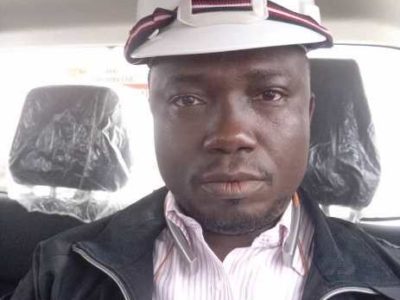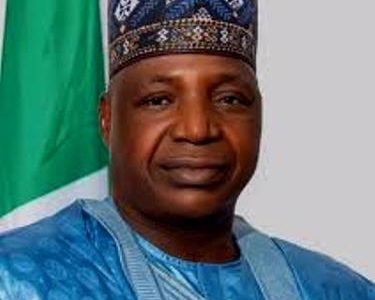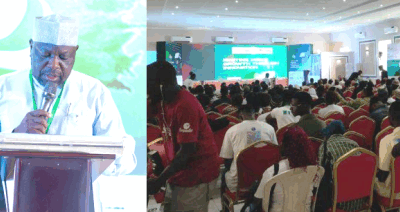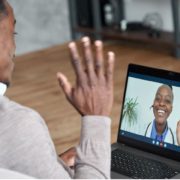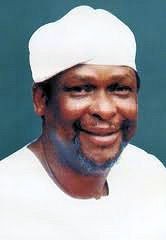 Immediate past Director General of NASRDA Professor Robert Ajayi Boroffice now a Senator at Nigeria’s Legislative Assembly tells SEGUN ORUAME, IT Edge News that Nigeria space exploration could only get stronger with increasing awareness by stakeholders of the benefits of space technology to national development
Immediate past Director General of NASRDA Professor Robert Ajayi Boroffice now a Senator at Nigeria’s Legislative Assembly tells SEGUN ORUAME, IT Edge News that Nigeria space exploration could only get stronger with increasing awareness by stakeholders of the benefits of space technology to national development
As the immediate past Director General of the NASRDA, you initiated the entire process of NigeriaSat-1, NigeriaSat-2 and NigeriaSat-X, you must be worried by insinuations that NigeriaSat-X is not working. Is the satellite in orbit and working?
NigeriaSat-X is working perfectly well. I am just from the ground station. I saw an image of Auckland produced by NigeriaSat-1. It was fantastic; 22 metres resolution better than what I have seen on NigeriaSat-1. So NigeriaSat-X is
working. I was told that when an image was downloaded, there was jubilation and for good reasons too. This is our own
satellite in space. To me, for us to produce a satellite and send it to space is an achievement; whether it works for one
day or two days or three days, it doesn’t really matter because we have paid for it anyway whether we send it to the space
or not. Because when we signed agreement for NigeriaSat-1 because of the know-how transfer contract terms to train our
engineers we built two satellites; one is the flight model that is the satellite we sent to space, that is NigeriaSat-1 and
then we built the engineering or training model which is lying in our lab at the agency now. And the difference between a
training model or engineering model and the flight model are just few things like the fuel tank and others things that you
put inside and convert it to flight model. So in the training plan, our partners built the flight model while our engineers
built the training model, so we asked why the training model can’t become a flight model. I challenged the engineers to
work on the training model and convert it to flight model and that was what we did. So instead of having one satellite,
Nigeria now has two satellites. And we called it NigeriaSatX because to us it is an experiment, I am happy that it is
working.
Much enthusiasm followed the launch of NigeriaSat-2 and NigeriaSat-X, and three days after that, there was controversy over will the existence of a ground station that ought to receive signal from the satellites.
Let me tell you we have only one ground station for NigeriaSat-2 and NigeriaSat-X. There are three payloads on Nigeria
Sat-2. We have 2.5m panchromatic, we have .5m multi-spectral; we have 32m multi-spectral which is a replacement for
NigeriaSat-1. This ground station for NigeriaSat-1 is the same ground station for NigeriaSat-2 and NigeriaSat-X. Not only
that this ground station can track our satellite, it can track any satellite in the world, which is the case, so why are we
saying it is not on ground. I challenge journalists to come to the facility, see the project manager who will take them to
the ground station to see that it works. I think it is mischievous for anyone to report falsely that the facility is not on
ground. There is something behind it. Three days after we launched a satellite, they say it is not working but now we are
downloading images. The image I saw from NigeriaSat-X of Auckland is fantastic.
This should be a Nigerian model of growth, what could have been the cause of the controversy?
Somebody is just being mischievous. Some people may not be happy with our progress and of course somebody who is not happy
can do anything to bring down the other person. While I cannot pinpoint any organization or any individual, what I can only
say is that the publications are mischievous, unpatriotic and completely out of tune with scientific reality. This is not
just correct. If you journalists do your work, you will be able to find the cause of those malicious publications.
You mentioned earlier talked about the impracticability of having two space agencies in the same place and in one country. NIGCOMSAT and NASRDA were one before they became two. One was supposed to be a unit, but precisely what is the status of NIGCOMSAT?
When they established NIGCOMSAT, it was to be the commercial wing of NASRDA to sell bandwidth and nothing more but
unfortunately it metamorphosed into a bigger organization having overlap functions with NASRDA. But I think that is what
government is trying to resolve now, that for instance only NASRDA should produce satellites, whether you call it
procurement or you call manufacturing. You can’t have two organisations belonging to government producing satellites, it
doesn’t make sense. So all these are being looked into by government and I think the series of meeting between the
concerned organisations, the Minister of Communications Technology, Minister of Science and Technology, the President
himself, Secretary to Government and a decision has been taken. The details of which I don’t know but I know any decision
that is taken will be in the interest of the country not interest of individuals.
You were DG of NASRDA and now in the Senate. How far can the Senate go in encouraging the growth of science and technology particularly space technology given your background?
We are all very hopeful that the seventh assembly is going to be very different from the previous ones because of the
quality of people that are now in the Senate. Under the guardian and leadership of the Senate President who is also an
engineer, I believe attention will be given to science and technology. If we are talking about Nigeria becoming one of the
twenty most advance countries in the year 202020, we will not achieve that without science and technology which has been
made clear to both the executives and the legislatures, so I believe that the Senate will normally encourage science and
technology, not only space technology but science and technology as a whole. We just started and as soon as committee are
set up, those that are given the oversight function for science and technology will ensure that science and technology are
given the right propositions in helping Nigeria to develop. People do not really appreciate the role science and technology
can play in our society. In fact, it is usually classified it as a social sector and not as an economic sector. The
National Planning Commission classified science and technology into the social sector not economic sector. Most country
will not do that, it is economic sector. When we started the space programme, most people were not confident that we will
be able to do it, but thank God today we are doing it.
Why are we investing so much on space technology, as the DG of NASRDA for nine years, what benefit will it be to the
country?
We derive a lot of benefits. The only problem is the benefits are not direct to single individual or a community that is
why people don’t really appreciate the benefit of space technology. Before I left, we embark on so many projects, on
cassava, on erosion in South Eastern states, cocoa and bitumen in Ondo state and many others including desertification
projects in conjunction with Ado Bayero University. We are now providing solutions for solving those problems and in the
area of deforestation using satellite aided images for precise solutions. There is hardly any area of human interest that
space technology cannot provide answer to depending on what you want to use it for. Don’t forget when we had this Hurricane
Katrina; we were the first country that produced the first image that US ecological survey used in accessing the damage
resulting from the Hurricane Katrina. Nigeria satellite is involved in imaging the Amazon in Brazil in Latin America in
accessing deforestation and we are not doing it for free, the Nigeria satellite is also being used in some agricultural
process. In Europe, they thought that we don’t know how to use it, that is why we embarked on capacity building not only
within NASRDA but with others sector that is using it, in environment, agriculture, medicine, and transportation. Before I
retire, there was a proposal to use our satellite to track a rail line that will be constructed from Lagos to Benin to
Abuja for us to know the shortest distance and with minimum cost. So these are the things we do.
If many people in the country do not appreciate what satellite technology can offer, what are people with your kind
background do to change the perception problem we have particularly within the legislative assemblies?
I was excited when I got to the senate that one of my colleagues actually has a PHD in space science and I also have a
colleague who is a professor in the same field, he came from the US and is in the senate, so three out of 109, I think that
is something that is encouraging, with the three of us speaking with one voice, I believe we will be able to influence the
national assembly not only about space technology but about science as a whole. I also believe it will take some time; we
are not giving up because if we had giving up ten years ago, we would not be where we are today. People said so many things
about us that they are talking about food security, we are talking of space. I don’t know if you have been to India. India
is about the fifth country now in term of space technology yet when you go to the streets of New Delhi or Mumbai; you will
see huge numbers of beggars begging for money. You cannot eliminate poverty totally before you talk of science and
technology because science and technology is to actually help you solve those problems in the short and long term. I am
particularly grateful to President Olusegun Obasanjo who appreciated what space science and technology is doing and he gave
us his backing seriously. And from what I have seen recently in resolving the issue of space science by Dr. Goodluck
Jonathan, I believe he appreciates space science and technology, he is a scientist himself, we have the same discipline; he
is a zoologist, and I am zoologist.
Is there a future for Nigeria space industry?
The more we sell it to our people and let them realize that it is contributing to the solution of our problems; definitely
that is the future for it. I remember about five years ago, one of our senators who was in senate asked me if there will be
NASRDA after me and I said yes there will be NASRDA because there are people whom I believe can do the job. I am happy
because I left 2008 and NASRDA is waxing stronger and stronger, so I believe there is a future because everybody is going
to space, even Kenya want to go space. Algeria, Tunisia, South Africa are countries that were not thinking of space before
now but are now thinking of space, so why should we discourage ourselves.




